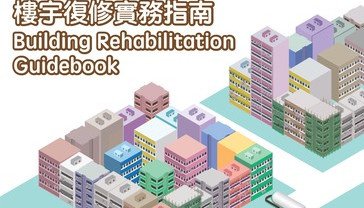Drafting building rehabilitation proposal
The category and scope of maintenance works required for different buildings are dependent on factors such as the age, location and extent of regular maintenance of the subject building. Since building rehabilitation works generally involve more complex technical issues, the works consultant shall suggest a scope of necessary rehabilitation works in accordance with the inspection/survey results and regulations of relevant statutory orders/notices for the consideration and approval of owners/OCs.
Presentation of inspection report by works consultant and discussion of proposed solutions with owners
With detailed explanation of the completed building inspection given by the works consultant, owners/OCs should gain a more thorough understanding of the current condition of their building, which in return helps them identify areas for further clarification from the consultant prior to an informed analysis of the necessity of the recommended works items, especially those of high costs, to protect their own interest.
The works consultant shall, in accordance with the results of building inspection, list the extent of damages and necessary repair works concerning building safety and hygiene facilities, and provide owners/OCs with various feasible solutions for building rehabilitation and enhancement, with reminders of necessary prompt actions against immediate dangers (if any) and uncertainties that may arise in works concerned.
Preparation of tender documents
The scope of and approach to building rehabilitation works for each building vary according to its setting and condition, and requirements of owners/OCs concerned. A professional works consultant should prepare work tender documents in accordance with the actual situation of individual building, as well as the rehabilitation and enhancement solutions approved by the owners/OCs concerned in order to reflect their requirements as clearly as possible.
When preparing tender documents, works consultant should:
• Understand the expectations or requirements of the owners/OCs on the quality, results and budgeting of the works;
• Reflect the expectations and requirements of the owners/OCs in the tender documents through selection of suitable materials and specifications for
the works;
• Discuss and identify the scope of works to be covered in the tender documents with the owners/OCs;
• Suggest appropriate tender submission methods for owners/OCs’ consideration;
• Set reasonable prerequisites and screening criteria before bid solicitation and avoid unnecessary or unreasonably high threshold for tender
submission;
• Avoid charging tenderers any ‘administrative fee’;
• Bid solicitation should be published in newspapers in the name of the subject building/OC only with no mentioning of the names and identities of
the works consultant;
• Handle enquiries during tender submission period in a professional and fair manner;
• Indicate written correspondence as the only means of communication between tenderers and works consultant on enquiries, with copies of such
correspondences sent to owners/OCs during the tender submission period;
• Use sample tender and contract documents prepared by professional organisations at present or the Building Rehabilitation Platform in future
wherever possible, with appropriate amendments made in accordance with individual works.
Types of works tender documents
The works consultant should advice on the appropriate type of tender document/contract for the procurement of works contractors in accordance with the scope and categories of the rehabilitation works concerned. Owners/OCs should seek to understand the differences among various types of tender documents/contracts beforehand to facilitate the management of works contracts in the future.
Want to learn more?


















